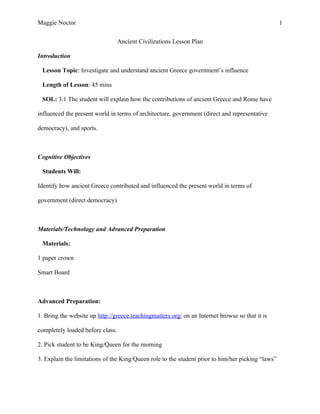
Ancient Civilization
- 1. Maggie Noctor 1 Ancient Civilizations Lesson Plan Introduction Lesson Topic: Investigate and understand ancient Greece government’s influence Length of Lesson: 45 mins SOL: 3.1 The student will explain how the contributions of ancient Greece and Rome have influenced the present world in terms of architecture, government (direct and representative democracy), and sports. Cognitive Objectives Students Will: Identify how ancient Greece contributed and influenced the present world in terms of government (direct democracy) Materials/Technology and Advanced Preparation Materials: 1 paper crown Smart Board Advanced Preparation: 1. Bring the website up http://greece.teachingmatters.org/ on an Internet browse so that it is completely loaded before class. 2. Pick student to be King/Queen for the morning 3. Explain the limitations of the King/Queen role to the student prior to him/her picking “laws”
- 2. Maggie Noctor 2 Teaching and Learning Sequence Introduction/Anticipatory Set: • At the beginning of the day pick a student to be the class king or queen for the morning. Give him/her a crown to wear. • Tell all the students that this morning they will have a king/queen for the classroom and the rest of the students will be citizens. • With the teacher’s input, tell the king/queen to make laws solely according to his or her wishes. The laws may include: having students pay taxes or fines, assigning seating or line arrangement, recess regulations, any other special privileges in the classroom. • After simulating king/queen reign for the morning, have students split into groups and discuss how they felt about having one person make all the rules without any input from the “citizens”. Lesson Development: • Bring the class back together and lead a quick discussion about how the students felt, did they feel represented? Or treated fairly? • Define the word democracy and put up on Smart Board. (Citizens vote to make their own laws) • Tell students that we are going to vote on the laws or choices that the king/queen made in the classroom earlier today. • Allow all students to place ideas for how the “laws” should be run, write ideas on the Smart Board • Then have all students vote as to which choice they would prefer.
- 3. Maggie Noctor 3 • After classroom “laws” have been voted on ask the students which kind of government they would prefer to have: democracy or king/queen reign. • Explain to students that Greece was the birthplace of democracy. • Describe Ancient Greece’s direct democracy – all male citizens were allowed to vote or may have a voice in the laws/government decisions. • Show students the video about democracy on website http://greece.teachingmatters.org/ • Explain to students they will split into groups of 3 or 4 to decide which side of the discussion they will side. • Play the clips from the Democracy in Ancient Greece website • After each clip allow the students a couple of minutes to digest the information from the clip and discuss in their groups. At least one person should be writing down the groups ideas and reasoning • After the last clip, let each group stand and state their opinion on the matter. Closure: • Once every group has presented their opinion, let the students vote as a class on whether or not Athens should go to war with Sparta. • After they have voted, explain to students that this is how Greek assemblies would have worked. • Explain to students that for homework tonight they should go home and think about all the things they learned today and answer the homework question with full sentences and examples. • Put the homework question on the Smart Board so that students may write it down.
- 4. Maggie Noctor 4 Homework: Answer the following question: Think about the government in Athens, Was the system in Athens more democratic than ours today, or less? Assessment: Formative: • Watch while students present their opinions about the king/queen reign and democracy; do the students reasons correspond with the correct type of government? Summative: • Collect the homework assignment and check for student understanding, do they incorporate examples that relate to ancient Greece or the government we have today? References: Virginia Department of Education. (2010). Enhanced Scope and Sequence. http://www.doe.virginia.gov/testing/sol/scope_sequence/history_socialscience_scope_sequence/ 2008/scopeseq_histsoc3.pdf. Jane Condliffe. (2010). Democracy in Ancient Greece. http://greece.teachingmatters.org/.